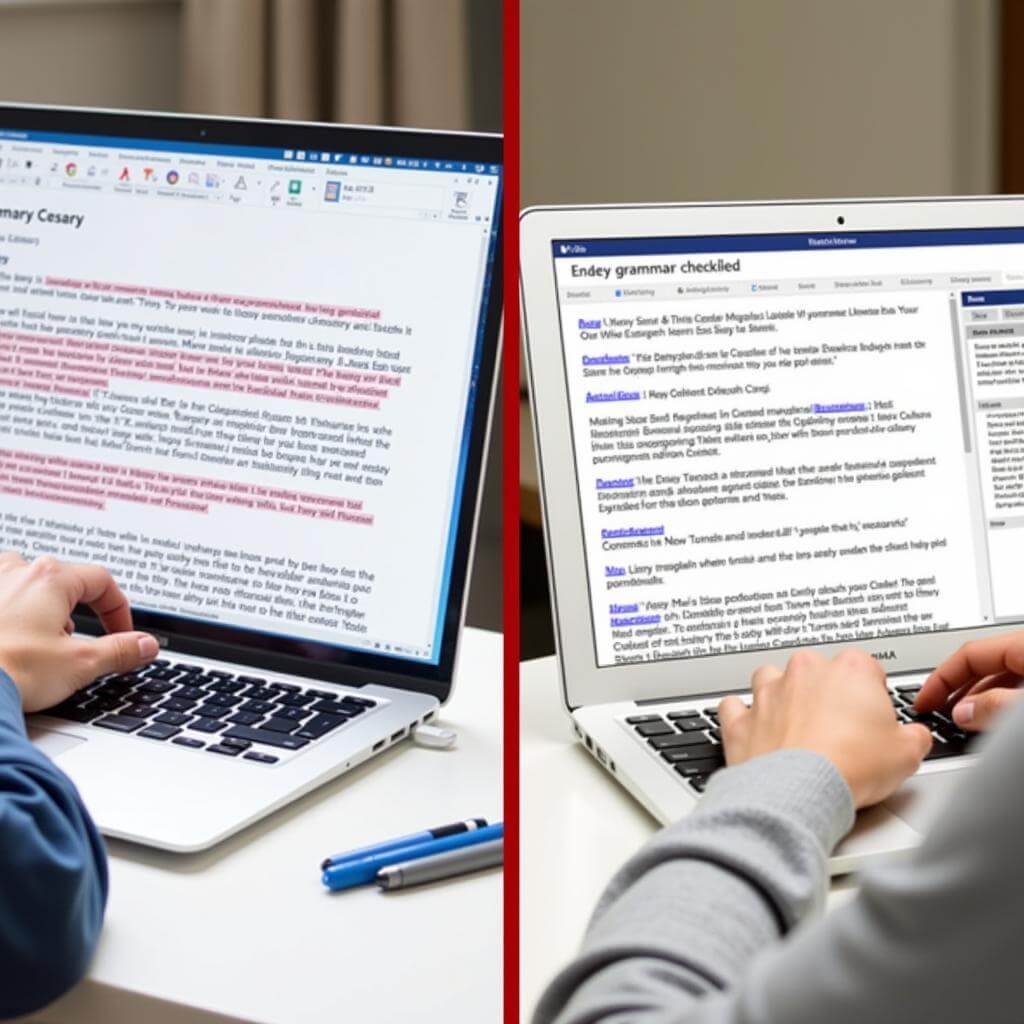Grammar checkers have become indispensable tools for IELTS candidates aiming to polish their writing skills. However, knowing how to use grammar checkers effectively is crucial for maximizing their benefits and avoiding potential pitfalls. This comprehensive guide will explore the best practices for leveraging grammar checkers to enhance your IELTS writing performance.
Understanding the Role of Grammar Checkers in IELTS Preparation
Grammar checkers are powerful allies in your IELTS journey, but they should be viewed as complementary tools rather than substitutes for thorough language learning. These digital assistants can help you identify and correct common grammatical errors, improve sentence structure, and enhance overall writing clarity.
Dr. Emily Thompson, a renowned IELTS expert with over 15 years of experience, emphasizes:
“Grammar checkers are excellent for catching surface-level errors, but they should never replace a deep understanding of English grammar and syntax. Use them as a second pair of eyes, not as your primary teacher.”
Improving grammar in IELTS writing requires a multifaceted approach, and grammar checkers are just one piece of the puzzle.
Selecting the Right Grammar Checker for IELTS
Choosing an appropriate grammar checker is crucial for effective use. Consider the following factors when selecting a tool:
- Accuracy and reliability
- Compatibility with IELTS-specific vocabulary and structures
- Customization options for academic writing
- Integration with word processors or online platforms
- User-friendly interface and clear explanations
Popular options include Grammarly, ProWritingAid, and Hemingway Editor. Each has its strengths, so it’s worth experimenting to find the one that best suits your needs.
Best Practices for Using Grammar Checkers in IELTS Preparation
1. Use Grammar Checkers as a Final Step
Always write your IELTS essays or responses first without relying on a grammar checker. This approach allows you to develop your natural writing style and critical thinking skills. Once you’ve completed your draft, run it through the grammar checker as part of your revision process.

2. Analyze and Understand Suggestions
Don’t blindly accept all suggestions provided by the grammar checker. Take the time to understand why a correction is being proposed. This analytical approach will help you learn from your mistakes and improve your grammar knowledge in the long run.
Professor James Chen, an IELTS writing instructor, advises:
“Treat each grammar checker suggestion as a learning opportunity. Ask yourself why the change is recommended and how it improves your writing. This reflective practice is invaluable for long-term improvement.”
3. Be Wary of Context-Specific Errors
Grammar checkers may not always understand the specific context of IELTS writing tasks. For instance, they might flag certain academic terms or suggest overly casual alternatives. Always use your judgment and refer to IELTS-specific guidelines when in doubt.
4. Focus on Recurring Errors
Pay special attention to errors that the grammar checker consistently flags in your writing. These recurring issues are likely areas where you need to concentrate your study efforts. Improving grammar for more formal writing often involves addressing these persistent challenges.
5. Utilize Advanced Features
Many grammar checkers offer advanced features such as style suggestions, vocabulary enhancement, and readability scores. Explore these options to refine your writing beyond basic grammar corrections.
6. Combine with Human Proofreading
While grammar checkers are powerful tools, they can’t replace human insight. Whenever possible, have a native speaker, teacher, or study partner review your writing alongside using a grammar checker for comprehensive feedback.
Avoiding Over-Reliance on Grammar Checkers
It’s crucial to strike a balance between utilizing grammar checkers and developing your own language skills. Here are some strategies to avoid over-dependence:
- Set aside time for manual proofreading without the checker
- Practice identifying errors in sample texts before using the tool
- Keep a personal error log to track your progress independently
- Regularly review grammar rules and apply them consciously in your writing
Using grammar for better cohesion often requires a nuanced understanding that goes beyond what grammar checkers can provide.
Integrating Grammar Checkers into Your IELTS Study Routine
To maximize the benefits of grammar checkers in your IELTS preparation:
- Use them consistently across all your practice essays
- Allocate specific time for grammar checker review in your study schedule
- Compare your self-edited work with grammar checker suggestions
- Use the tool to analyze high-scoring IELTS sample essays for insights
Remember, the goal is to improve sentence clarity with grammar while maintaining your unique voice and meeting IELTS task requirements.
Conclusion
Mastering how to use grammar checkers effectively can significantly enhance your IELTS writing performance. By treating these tools as supportive aids rather than infallible solutions, you can refine your grammar skills, improve your writing clarity, and boost your confidence in tackling IELTS writing tasks. Remember to balance technology with traditional learning methods and always prioritize understanding over mere correction. With practice and discernment, grammar checkers can become valuable allies in your quest for IELTS success.
FAQ
How often should I use a grammar checker during IELTS preparation?
Use a grammar checker for every practice essay you write, but only after you’ve completed your initial draft and self-editing process.
Can grammar checkers help with IELTS-specific vocabulary?
While some advanced checkers offer vocabulary suggestions, it’s best to rely on IELTS-specific resources for vocabulary enhancement.
Will using a grammar checker improve my IELTS score?
Grammar checkers can help improve your writing accuracy, potentially leading to a better score, but they should be used in conjunction with comprehensive IELTS preparation.
Are free grammar checkers sufficient for IELTS preparation?
Free versions can be helpful, but premium versions often offer more advanced features that are particularly useful for academic writing required in IELTS.
How do I know if a grammar checker’s suggestion is correct for IELTS writing?
Always cross-reference suggestions with IELTS writing guidelines and trusted grammar resources to ensure appropriateness for the exam context.
Can grammar checkers help with Task 1 and Task 2 writing differently?
Yes, some checkers allow you to specify the type of writing, which can be useful for tailoring suggestions to the different requirements of Task 1 and Task 2.